Did you know only 20% of people who are overweight or obese keep off the weight long-term? A 2018 study found that slow and steady weight loss works best. Making small, achievable lifestyle changes helps lose weight in a healthier way.
A sustainable diet and healthy eating habits are key for lasting weight loss. They focus on a calorie deficit and eating nutrient-rich foods.
Eating a variety of whole foods like fruits, vegetables, whole grains, lean proteins, and healthy fats supports weight loss and health. Creating a balanced plate and practicing mindful eating help develop healthy habits. These habits lead to a calorie deficit and support long-term weight loss.
Key Takeaways
- Achieving sustainable weight loss requires a long-term approach, focusing on healthy eating and lifestyle changes rather than quick fixes.
- A sustainable diet that includes a variety of whole foods can help support weight loss and overall health.
- Practicing mindful eating and portion control can help individuals make healthier food choices and reduce calorie intake.
- Regular physical activity, such as 150 minutes of moderate-intensity exercise per week, can support weight loss and overall health.
- Getting enough sleep, aiming for at least 7 hours per night, is essential for weight management and overall health.
- Seeking social support from friends, family, or a healthcare professional can help individuals stay motivated and accountable throughout their weight loss journey.
Understanding a Sustainable Diet
A sustainable diet means making lasting changes for better health. It’s about eating a balanced diet that gives your body what it needs. It also involves portion control to keep a healthy weight and avoid chronic diseases.
Adding healthy fats, lean protein, and complex carbs to your meals is key. These nutrients give you energy and help you stay healthy. A sustainable diet is about making smart food choices, not cutting out foods you love.
What is a Sustainable Diet?
A sustainable diet is flexible and fits your lifestyle. It focuses on whole foods like fruits, veggies, grains, and lean proteins. It’s a long-term plan for healthy eating, not a quick fix.
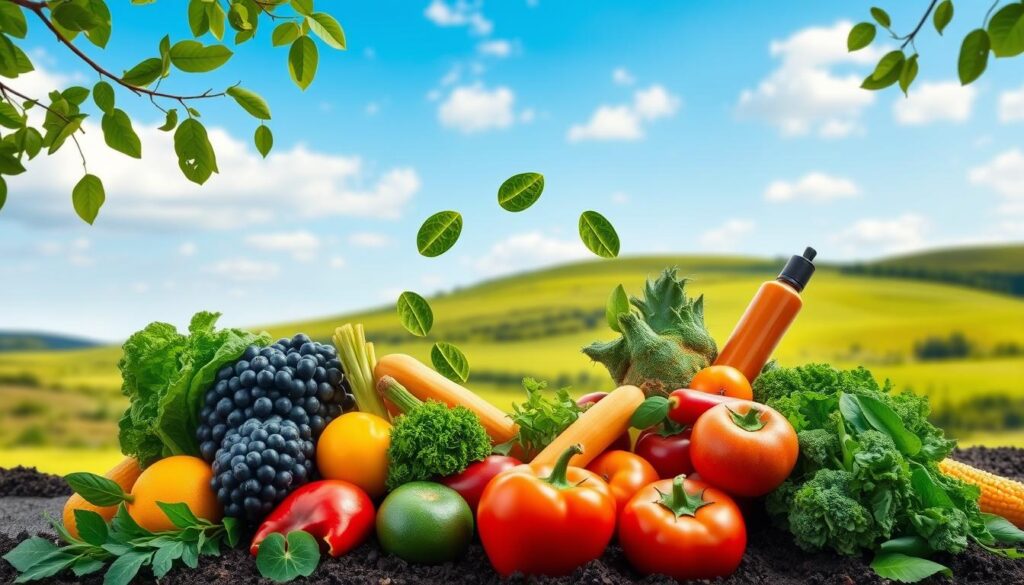
Benefits of a Sustainable Diet
There are many benefits to a sustainable diet. Some include:
- Improved weight management
- Reduced risk of chronic diseases
- Increased energy levels
- Improved overall health and well-being
By choosing healthy foods and habits, you can boost your health. This reduces the risk of serious diseases.
Incorporating Whole Foods into Your Meals
Whole foods are key to a healthy diet. They offer essential nutrients and fiber. These foods are not heavily processed, keeping their natural goodness.
By choosing whole foods, you can make your diet rich in nutrients. This can help with weight loss and better health.
A whole foods diet focuses on real, healthy foods. Switching from processed foods can lead to weight loss and better health. Foods like fruits, vegetables, whole grains, lean proteins, and healthy fats are great choices. They can be prepared in many ways, making them easy to add to your meals.
Here are some tips for planning your meals:
- Shop the perimeter of the grocery store to find less processed products
- Look for minimally processed options in the natural foods aisle
- Choose whole grains like brown rice and quinoa
- Incorporate lean proteins and healthy fats into your meals
Try making salads, stir-fries, and grilled meats. These dishes use whole foods, making them nutritious and tasty. For instance, a salad with greens, veggies, and lean protein is a healthy choice. A stir-fry with brown rice, veggies, and lean protein is also a great option.
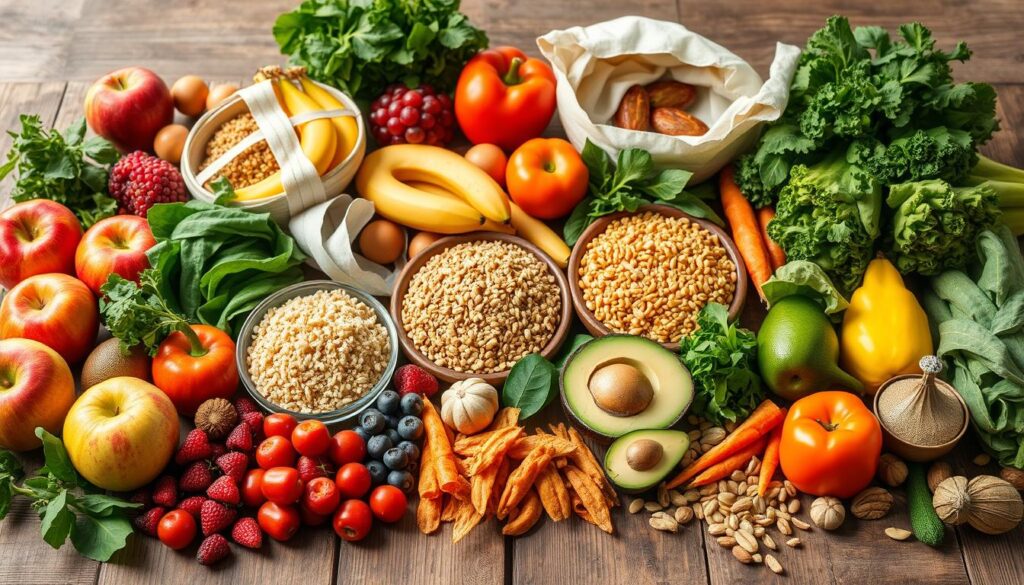
It’s also good to think about low-calorie snacks and healthy recipes. Choosing whole foods and preparing them in different ways can make your diet rich in nutrients. This can help with weight loss and better health, making it easier to stay healthy.
| Food Group | Examples of Whole Foods | Benefits |
|---|---|---|
| Fruits | Apples, bananas, berries | High in fiber, vitamins, and antioxidants |
| Vegetables | Broccoli, carrots, spinach | Rich in vitamins, minerals, and antioxidants |
| Whole Grains | Brown rice, quinoa, whole wheat | High in fiber, vitamins, and minerals |
The Role of Portion Control in Weight Loss
Portion control is key for managing weight. It helps people develop good eating habits and keep their diet balanced. By measuring food portions, you can track calories and make better food choices. This supports weight loss and helps keep weight in check.
Studies show big portions can lead to eating more calories, which can stop weight loss. For example, a study found people ate 30% more calories with a bigger portion of macaroni and cheese. Another study showed women ate 31% more and men ate 56% more with a 12-inch sandwich than a 6-inch one.
Effective Portion Control Strategies
So, how do you control portions well? Here are some tips:
- Use a food scale or measuring cups to measure portions accurately
- Choose smaller plates and bowls to help control portion sizes
- Fill half your plate with vegetables, a quarter with protein, and a quarter with carbohydrates
- Drink water before meals to help control hunger and portion sizes
By using these strategies, you can build healthy habits. These habits support weight loss and overall health. Remember, portion control is not about missing out on favorite foods. It’s about being aware of calories and making choices that help you reach your weight goals.
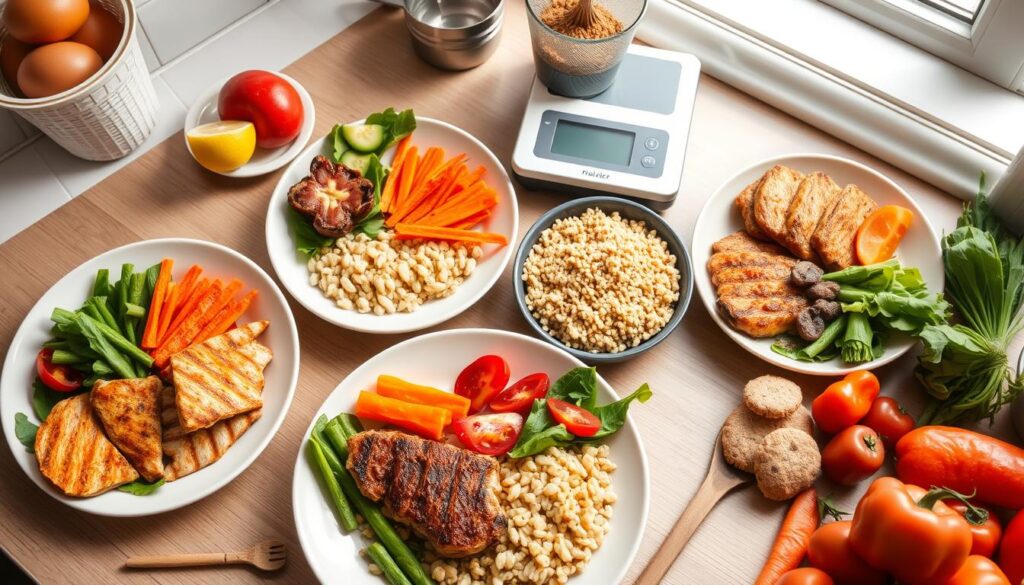
Hydration and Its Impact on Weight Loss
Drinking enough water is key for health and weight loss. It helps control hunger, leading to fewer calories. Studies show that water boosts body function, aiding in thinking and fat burning.
A study showed that drinking 6.8–8.5 oz of warm water after meals helped people lose more weight. Another study found that drinking an extra cup of water daily could prevent 0.13 kg (0.23 lb) of weight gain. These results underline water’s role in weight loss.
Why Water Matters
Water is vital for losing weight because it aids digestion, metabolism, and hunger control. Mild dehydration can cause fatigue, confusion, and headaches, making weight loss harder. But, staying hydrated boosts motivation, reduces stress, and helps avoid fatigue and confusion.
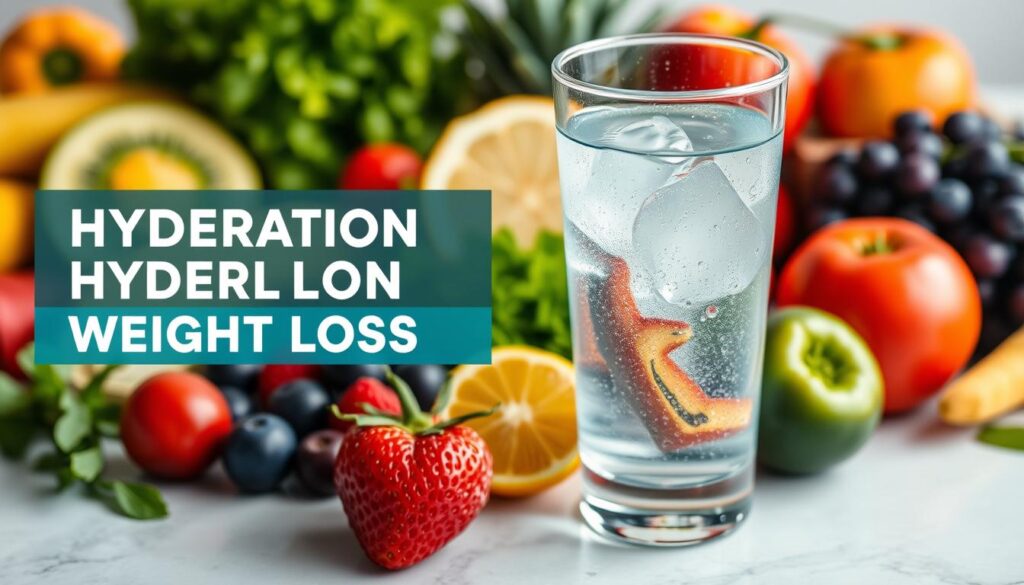
Tips for Staying Hydrated
It’s advised to drink at least 2.2 L (74 oz) of water daily for women and 3 L (101 oz) for men. Drinking water before meals can also help control hunger. Here are more tips:
- Carrying a water bottle all day
- Drinking water before and after working out
- Avoiding sugary drinks and caffeine, which can dehydrate
The Link Between Hydration and Appetite
Thirst can sometimes feel like hunger, causing us to eat more. Drinking water can help reduce hunger, leading to fewer calories. A study showed that drinking two glasses of water before a meal can cut food intake by 22%.
Building Healthy Eating Habits
It’s important to develop healthy eating habits for a balanced weight. A balanced plate should have fruits, vegetables, whole grains, lean proteins, and healthy fats. This mix is key to a healthy diet.
Mindful eating is also crucial. It means listening to your body’s hunger and fullness signals. Eating slowly and enjoying your food can help control cravings. Having healthy snacks on hand also helps keep your diet in check.
Creating a Balanced Plate
A balanced plate should have a variety of foods. Here are some tips:
- Include colorful fruits and vegetables
- Choose whole grains like brown rice and quinoa
- Opt for lean proteins like chicken and tofu
- Add healthy fats from nuts and avocado
Mindful Eating Practices
Mindful eating can curb cravings and prevent overeating. Here are some tips:
- Eat slowly and enjoy your food
- Listen to your body’s hunger and fullness cues
- Avoid distractions like TV and phones while eating
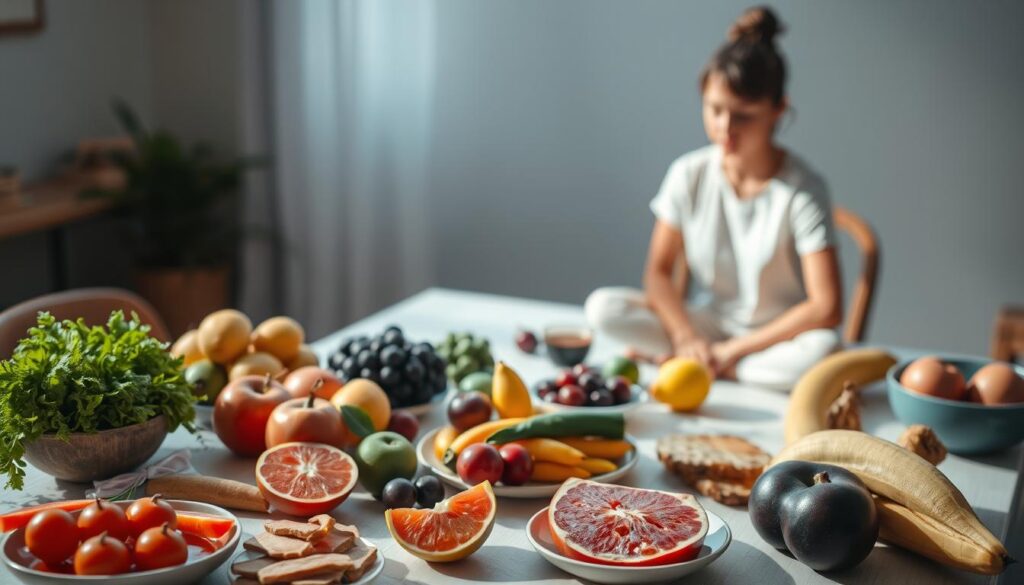
Strategies for Overcoming Cravings
Overcoming cravings can be tough, but there are ways to do it. Here are some tips:
- Choose healthy alternatives like fruits and veggies
- Practice self-care like meditation and yoga
- Drink plenty of water to stay hydrated
| Food Group | Examples | Benefits |
|---|---|---|
| Fruits | Apples, bananas, berries | High in fiber, vitamins, and antioxidants |
| Vegetables | Broccoli, carrots, spinach | High in fiber, vitamins, and minerals |
| Whole Grains | Brown rice, quinoa, whole wheat bread | High in fiber, vitamins, and minerals |
Maintaining Long-Term Success
Reaching sustainable weight loss might seem hard, but keeping it up is key for a healthy life. Start with achievable goals and keep a close eye on your progress. Aim to lose 1 to 2 pounds (0.5 to 1 kilogram) each week. This slow pace is more likely to stick.
Small wins, like hitting a 5% weight loss mark, are big motivators. They help you stay on track. Use tools like food journals or progress photos to track your journey. This helps you spot patterns and tweak your plan as needed.
Remember, your body might change, making it harder to keep weight off. So, be ready to adjust your approach. Having a supportive circle of friends, family, and health pros is crucial. They offer the encouragement and advice you need.
In the end, long-term success in weight management is about a lifelong dedication to healthy lifestyle choices. With the right support systems and focus on weight maintenance, you can reach and keep your weight loss goals for years.





















